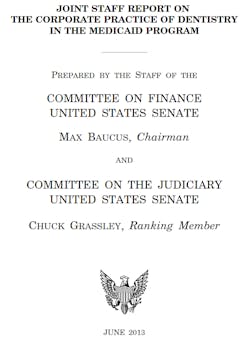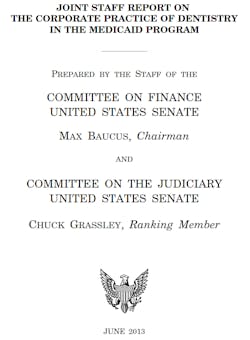American Dental Association and Academy of General Dentistry respond to Senate report on corporate dentistry, disagree with recommendations
July 29, 2013
The two types of dentist shortages that limit children's access to care
Dentist workforce size is not a major factor in access for the underserved
Senator Baucus introduces the report by stating that issues “regarding the corporate practice of dentistry in the Medicaid program … are analyzed primarily in the context of one company, Small Smiles.” The report also focuses on complaints received about ReachOut Healthcare America (ReachOut).
Whistleblowers came forward in 2011 claiming, “dental management companies own the dental clinics and have complete control over operations, including the provision of clinical care by clinic dentists.”
Many states have laws that require the owner of a dental practice to be a licensed dentist, but some of these corporations have contracts with dentists that are only the owners in name and not in practice.
The problem with this arrangement is that profits are valued over quality of care. Since most patients at these corporate dental clinics are children of low-income families, they are the ones that have been receiving low-quality care – often advised to undergo unnecessary dental treatment merely so the company can make a profit.
The report examines five corporate dental chains, including:
- Church Street Health Management (CSHM), which operated 70 Small Smiles dental clinics in 22 states and D.C. at the time of investigation
- NCDR, LLC, which owns 130 Kool Smiles clinics in 15 states and D.C.
- ReachOut Healthcare America, which operates mobile clinics that treat children at schools in several states
- Heartland Dental Care, Inc., which operates more than 300 clinics in 18 states
- Aspen Dental Management, Inc., which operates more than 300 Aspen Dental clinics in 22 states.
Recommendations
The summary offers recommendations to improve the standard of dental care for Americans, specifically those who rely on Medicaid. They are as follows:
- CSHM, Small Smiles, and similar corporate entities should be excluded from participating in the Medicaid program
- States should enforce existing laws against the corporate practice of dentistry
- States that consider licensure of mid-level dental providers should be reimbursed by the Medicaid program: “Some in the dental profession argue that ‘low Medicaid reimbursement rates’ are the root cause of the types of abuses described in this report. Yet, the dental profession has also opposed allowing mid-level providers into the program who could provide much of the needed care at the current reimbursement rates.”
Reactions from the dental industry
In response to the report, the American Dental Association issued a press release, writing, “Such conduct is inexcusable, and should be prosecuted vigorously. However, equally disturbing is the broad brush that implicates a whole class of practice models rather than focusing on the actual offenders.”
Perhaps as a response to both the Senate report and the ADA’s press release, the president-elect of the Academy of General Dentistry W. Carter Brown, DMD, FAGD, said, “The report is not a broad-brush discussion of all of the corporate models. Rather, it offers an in-depth analysis that states may use to determine when business models, actions, or contractual agreements of dental management companies may not be providing the appropriate level of treatment planning, care, and oversight.”
Though the ADA and AGD may view how the report was written in a different light, they both have a problem with the recommendations in the report.
“The nation should be greatly concerned with the findings of the Senate report, which we hope will spur more progress,” the ADA press release states. “Only a multi-faceted, targeted approach to the numerous barriers that impede dental health will work. Action for Dental Health represents our commitment to leading the way toward the day when all Americans who seek it get the care they need to enjoy good oral health they deserve.”
The AGD says something similar. “Data has shown that relying on treatment-based solutions does not create improved health outcomes for the community – only more fillings placed.” The AGD press release continues. “In July 2012, the AGD released the white paper Barriers and Solutions to Accessing Care, delineating the barriers to care and proposing proven solutions for improving access to and utilization of care, including promoting oral health literacy, improving Medicaid administration, and utilizing patient navigators rather than nondentists who perform dentistry.”


